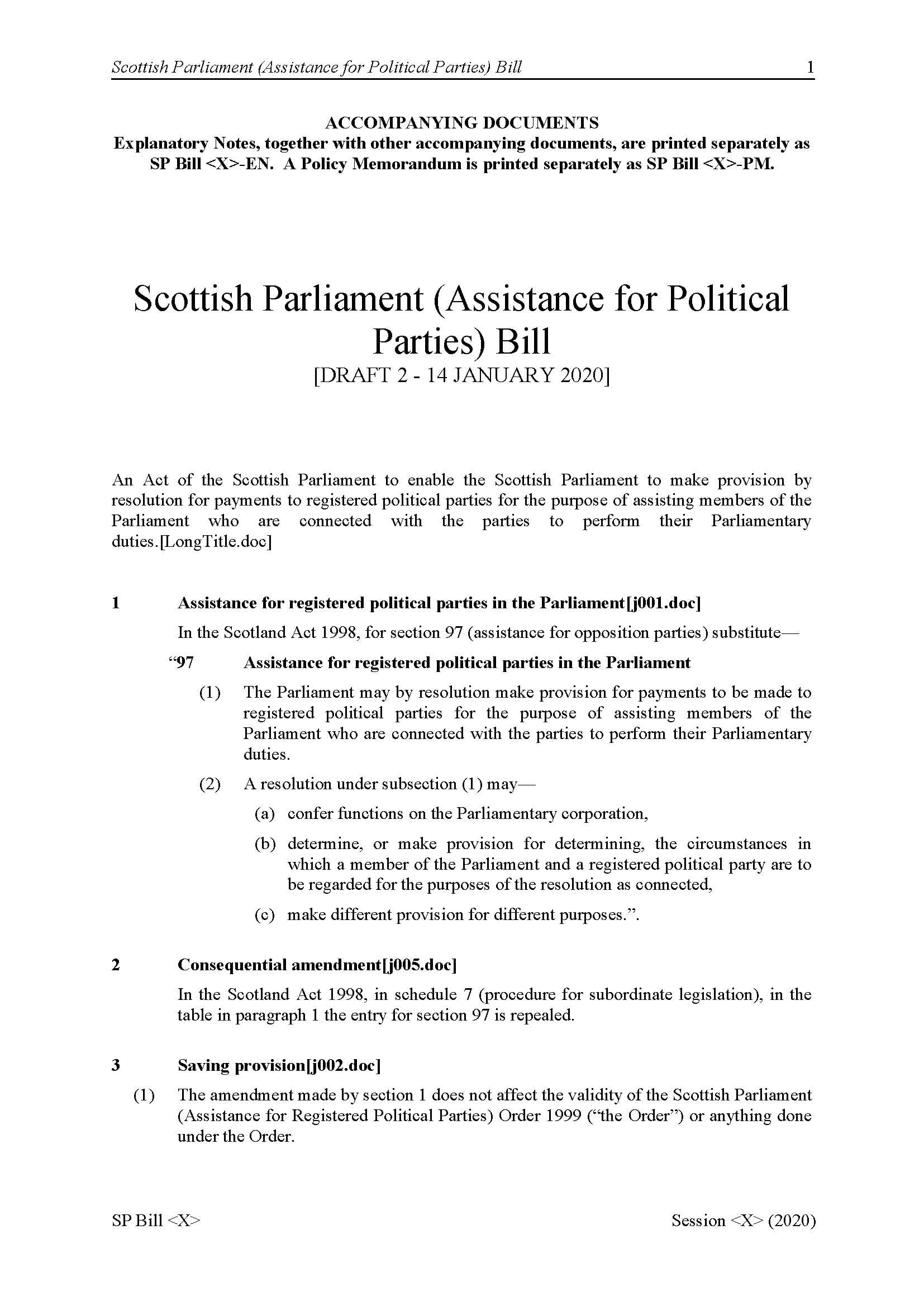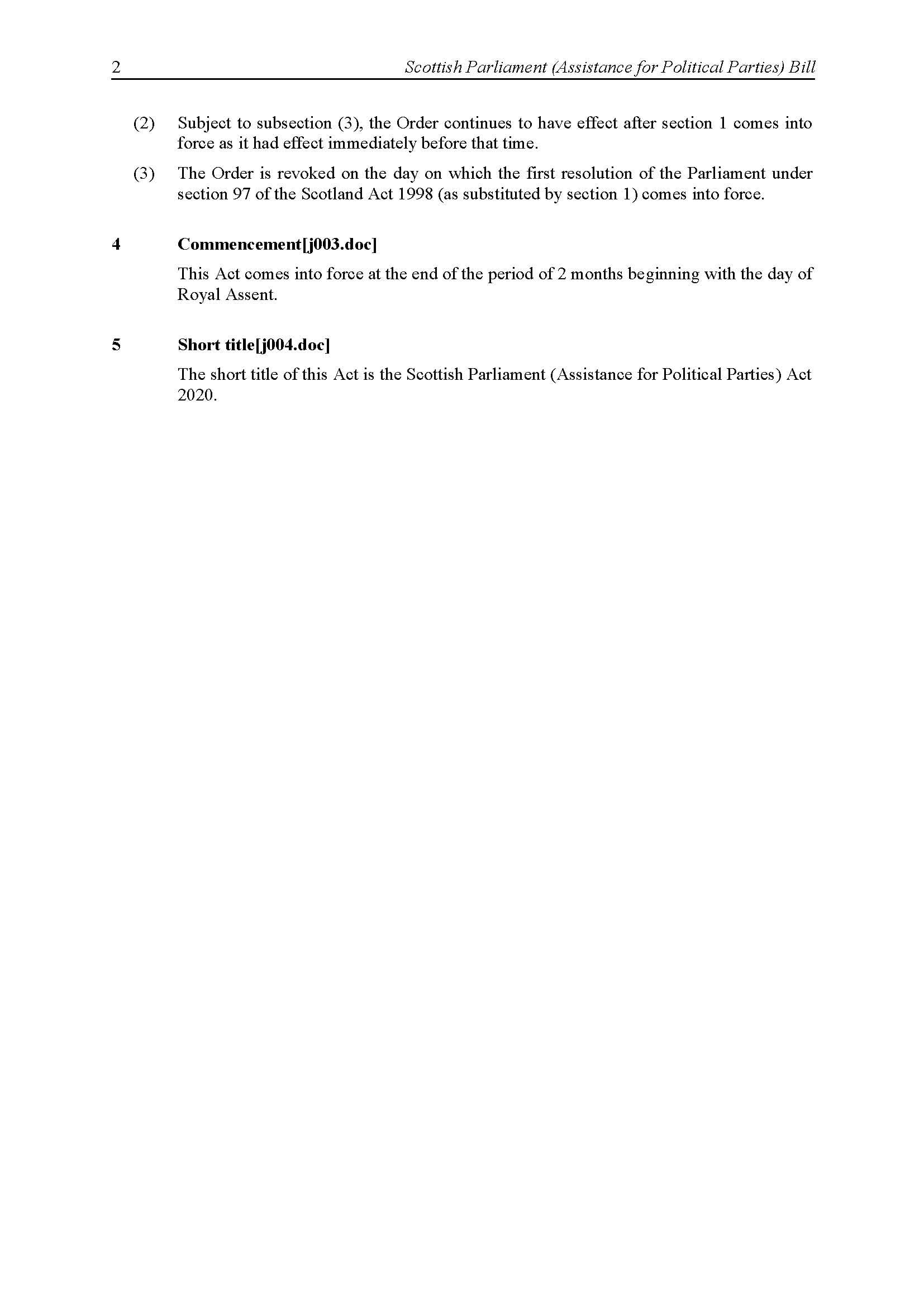Standards, Procedures and Public Appointments Committee
Proposal for a Committee Bill - Scottish Parliament (Assistance for Political Parties) Bill
Introduction
This report sets out the provisions of a proposed Committee Bill (under Rule 9.15 of Standing Orders) which would bring responsibility for setting the terms of funding to registered political parties, which currently lies with the Scottish Ministers, within the responsibility of the Scottish Parliamentary Corporate Body.
Background
Most political parties represented in the Scottish Parliamenti receive a capped financial provision for expenditure incurred in connection with their Parliamentary duties. The payments are colloquially known as “Short money”ii and are made under an Order in Counciliii provided for by the Scotland Act 1998. Responsibility for setting the terms of such payments, via an Order in Council, currently lies with Scottish Ministers.
While the scheme is currently administered and funded by the Scottish Parliamentary Corporate Body (SPCB), it is the Scottish Ministers who have the power to make changes to it. The SPCB wished to bring this power within the ambit of the Scottish Parliament and, before referring the matter to the Scottish Parliament’s Parliamentary Bureau, the Presiding Officer sought the view of the Scottish Government. The Scottish Government indicated that it was content that responsibility for these provisions be transferred to the Scottish Parliamentary Corporate Body.
The Bureau invited the Standards, Procedures and Public Appointments Committee (SPPA Committee) to propose and introduce a Committee Bill which would transfer responsibility for setting the terms of the Short money arrangements from Scottish Ministers to the SPCB.
The Bureau also recommended to the Parliament that a change be made to the remit of the SPPA Committee for the purposes of considering a “proposal for a Bill relating to the arrangements for financial assistance to registered political parties represented in the Parliament”. The Parliament agreed the remit change at its meeting on 26 June 2019. The SPPA Committee subsequently agreed, at its meeting on 12 September 2019, to make a proposal for a Committee Bill along the lines suggested to it by the SPCB.
Policy
Current arrangements
The mechanism for the provision of funding to registered opposition political parties is governed by section 97 of the Scotland Act 1998, which allows Her Majesty, by Order in Council, to provide for the payment of money to non-Government parties. The current Order was made in 1999 and has governed the arrangements since the creation of the Parliament. It was prepared jointly by the United Kingdom Government and the then Scottish Executive in 1999, but the Scotland Act 2016, in changing the procedural requirements, removed the UK Government's role, leaving the Scottish Ministers solely responsible for the content of draft Orders submitted to Her Majesty.
The current Order specifies a maximum sum of money to be paid by the SPCB to each eligible party, in respect of each MSP connected to that party who is not a Minister, as reimbursement for expenses incurred by those MSPs in performing their parliamentary duties. This sum (the “relevant amount”) was originally set at £5,000 but has been uprated annually in line with the retail prices index. In the 2017-18 period, it was £8,224.68. The Scottish Parliament's website records the amounts paid to each eligible party each year. Payments are made on the basis of claims submitted by each party and an annual audit certificate of assurance is required to cover all payments made.
Proposed change
As already noted, the Scotland Act 2016 removed the UK Government's role in the process, leaving the Order-making power with the Scottish Ministers. The scheme established by the Order is already administered by the SPCB and funding is provided from its budget. This division of roles contrasts with the arrangements for paying Members’ salaries, allowances and pensions. Under section 81 of the Scotland Act 1998, the SPCB has always been responsible both for setting the terms of these schemes with Parliament’s approval, and for administering and funding them and so is arguably best placed to oversee any future arrangements with respect to Short money.
Furthermore, the SPPA Committee considers that the Scottish Government, as the party or parties of power, is not ideally placed to determine the funding of the other political parties represented in the Parliament. The SPCB, by contrast, consists of MSPs elected by the whole Parliament and acts in a politically neutral manner. As such it is better placed to take decisions in respect of the funding of opposition parties.
The Bill being proposed via this report is narrow in scope. It will transfer responsibility for setting the terms of financial assistance from the Scottish Ministers to the SPCB. It will not seek to make changes to the existing scheme and formula for the disbursement of funds. As such, the proposed Bill will not itself affect the amount paid to parties.
If the Bill is passed by the Parliament and receives Royal Assent, arrangements for financial assistance would be set by Parliamentary resolution rather than by Order in Council. It is envisaged that the SPCB would consult on any changes to the existing arrangements, and formal approval would be required by the Parliament as a whole. In this way, any alteration to the amount of support available to eligible parties, or any change to the rules on eligibility, would be determined by all MSPs.
Consultation
The SPPA Committee wrote to MSPs, political parties, the Scottish Parliament's Parliamentary Bureau, the Scottish Government and the Electoral Commission seeking views on these proposals. The responses are published on the Committee's webpage.
Provisions of the proposed Bill
The Bill makes the following provisions:
A power for the Scottish Parliament to make resolutions - replacement of section 97 of the Scotland Act
As indicated above, the Bill would replace the existing section 97 of the Scotland Act 1998, which enables an Order in Council (by Her Majesty) to provide for the Parliamentary corporation to make payments to registered political parties, for the purpose of assisting members of the Parliament who are connected with such parties to perform their Parliamentary duties.
In essence, therefore, replacement section 97 enables what is provided for at present by means of Order in Council, in relation to payments to registered political parties, to be addressed by way of Parliamentary resolution. Any future changes to the position on eligibility can then be addressed by means of a resolution of the Parliament (which would require the approval of the Parliament as a whole). It may be noted that this structure reflects the approach taken under the Scotland Act 1998 in relation to remuneration of members, at section 81.
Transitional provision
The replacement section 97, when it comes into force, would not by itself impact on the validity of the existing Order. Under the proposed Bill, that Order will remain in force until the first resolution made under the new section 97 comes into force, at which point the Order is revoked. This ensures a clean transition from the current regime (set out in the Order) to a new one (set out in a resolution), at a time of the Parliament's choosing.
Commencement
It is envisaged that the new Act, providing for a replacement section 97, would come into force shortly after Royal Assent, giving the Parliament control over the Short money arrangements from early in Session 6. Nothing about the present arrangements would change until such time as the first resolution under the new Act is made.
What the Bill will not do
The Bill does not seek to make changes to the existing scheme nor to the formula which is applied for the disbursement of funds. Accordingly, it will not affect the amounts paid to parties. The amounts paid to parties in future will be determined by the Parliament as a whole in any resolution.
Draft Bill
A draft Bill is set out in Annexe A to this paper.
Conclusion
The Committee seeks the Parliament's approval to introduce a Bill to give effect to the proposal contained in this report. The attached draft bill may require some refinement before it is introduced, although it is envisaged that the introduced bill will be broadly similar to the draft.
Recommendation
The Committee recommends that the Parliament agrees to this proposal to introduce a Committee Bill.
Annexe A: Draft Bill

